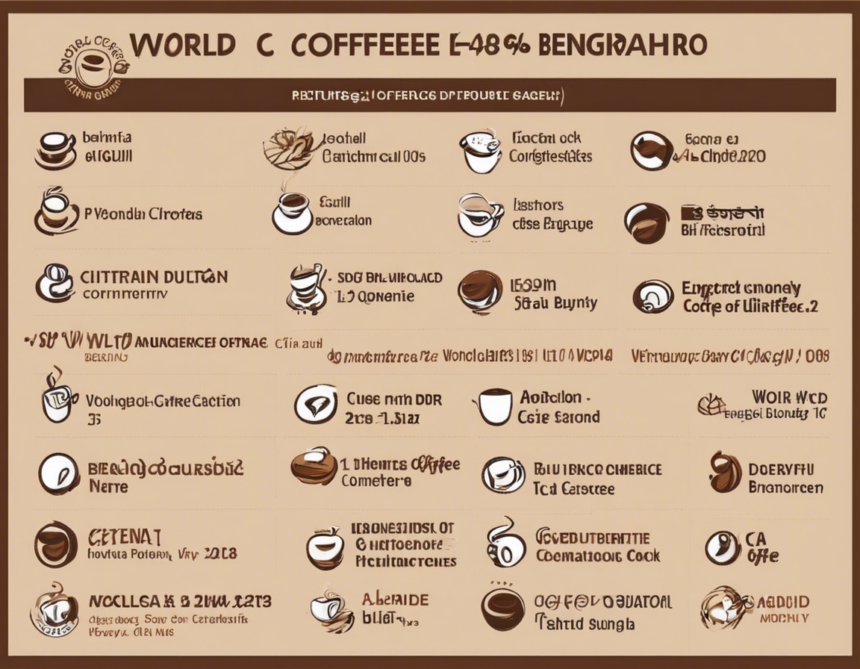The World Coffee Conference held in Bengaluru served as a pivotal platform for industry leaders, growers, and enthusiasts to converge and delve into the latest trends shaping the coffee landscape. From sustainable practices to technological advancements, this event explored a myriad of topics that are revolutionizing the way we perceive and consume our daily brew. In this article, we will dissect key insights and trends showcased at the conference, shedding light on the future direction of the global coffee industry.
Sustainability in Coffee Production
Sustainability emerged as a central theme at the World Coffee Conference, with environmentally-friendly practices taking the spotlight. From organic farming methods to rainforest alliance certifications, the industry is witnessing a shift towards more sustainable production processes. Consumers are increasingly seeking ethically sourced and environmentally conscious coffee, driving the demand for sustainable practices across the supply chain.
Key Points:
- Direct Trade Relationships: fostering direct relationships between growers and buyers to ensure fair compensation and sustainable practices.
- Carbon Neutral Operations: implementing initiatives to reduce carbon footprint and promote eco-friendly operations.
The Rise of Specialty Coffee
Specialty coffee continues to gain momentum, captivating coffee aficionados with its exceptional quality and unique flavor profiles. The conference highlighted the growing interest in specialty coffee, with a focus on the cultivation of high-quality beans and the art of coffee brewing. Specialty coffee is not just a beverage but an experience that celebrates the nuances of regional flavors and artisanal craftsmanship.
Key Points:
- Single-Origin Beans: highlighting the distinct characteristics of beans from specific regions.
- Third Wave Coffee Movement: emphasizing quality, sustainability, and traceability in coffee production and consumption.
Technology and Innovation in Coffee
Innovation was palpable at the World Coffee Conference, with technology playing a pivotal role in shaping the future of the industry. From smart coffee machines to blockchain-enabled traceability, advancements in technology are revolutionizing how coffee is sourced, brewed, and enjoyed. Coffee enthusiasts can now experience a seamless and personalized coffee journey, thanks to the integration of cutting-edge technologies.
Key Points:
- IoT Devices: enabling remote brewing control and personalized coffee preferences.
- Blockchain Traceability: providing transparency in the coffee supply chain, from bean to cup.
Inclusivity and Diversity in Coffee Culture
Diversity and inclusivity were celebrated at the conference, showcasing the rich tapestry of cultures, communities, and stories behind every cup of coffee. The industry is embracing diversity and empowering underrepresented groups, fostering a more inclusive coffee culture that honors the contributions of all individuals along the value chain. From women in coffee to indigenous growers, the World Coffee Conference underscored the importance of creating a more equitable and diverse industry.
Key Points:
- Gender Equality: promoting equal opportunities for women in coffee production and leadership roles.
- Empowering Communities: supporting indigenous growers and marginalized groups in the coffee industry.
Future Outlook: Trends to Watch
As we reflect on the insights gleaned from the World Coffee Conference, it is evident that the coffee industry is at a pivotal juncture, poised for transformation and innovation. From sustainable practices to technological advancements, the future of coffee looks promising, with a renewed focus on quality, sustainability, and inclusivity. Embracing these trends will not only shape the industry’s trajectory but also redefine our relationship with coffee, elevating it from a morning ritual to a cultural phenomenon.
Frequently Asked Questions (FAQs)
1. What are the main sustainability challenges in the coffee industry?
Answer: The main sustainability challenges in the coffee industry include deforestation, water consumption, and fair labor practices. Implementing sustainable farming methods and certifications can help address these challenges.
2. What defines specialty coffee?
Answer: Specialty coffee is characterized by its exceptional quality, unique flavor profiles, and high grading standards. It focuses on the specific origin of beans and the art of coffee brewing to deliver a premium coffee experience.
3. How is technology shaping the coffee industry?
Answer: Technology is revolutionizing the coffee industry through innovations such as smart coffee machines, blockchain traceability, and IoT devices. These advancements enhance efficiency, sustainability, and personalization in coffee production and consumption.
4. Why is inclusivity important in the coffee culture?
Answer: Inclusivity in the coffee culture promotes diversity, equality, and empowerment across the value chain. By embracing inclusivity, the industry can celebrate the contributions of all individuals and create a more equitable and vibrant coffee community.
5. What trends can we expect to see in the future of coffee?
Answer: Future trends in the coffee industry include a focus on sustainability, technological innovation, specialty coffee, and inclusivity. Consumers can anticipate a more diverse, personalized, and ethically conscious coffee experience in the years to come.
As the global coffee industry continues to evolve and adapt to changing consumer preferences and market dynamics, events like the World Coffee Conference in Bengaluru serve as catalysts for innovation and collaboration. By embracing sustainability, specialty coffee, technology, and inclusivity, the industry is charting a course towards a more vibrant, responsible, and inclusive coffee culture.


Leave a Reply